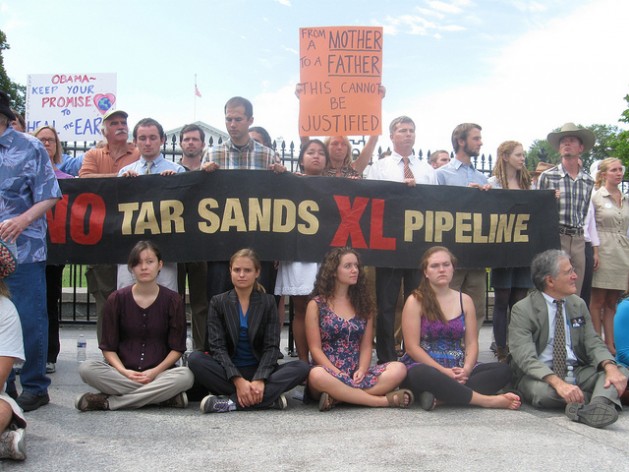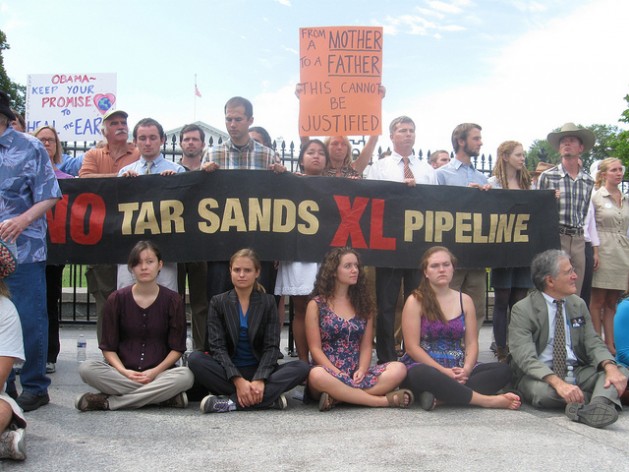By Tharanga Yakupitiyage | (Inter Press Service) | – –
UNITED NATIONS, Nov 24 2016 (IPS) – Although U.S. President-elect Donald Trump has hinted he may be softening his stance on climate change, many are still uncertain of what lies ahead concerning climate action within and beyond the United States.
A demonstration against the XL Pipeline. Credit: Kanya D’Almeida/IPS
In a meeting with New York Times on Tuesday, the newly elected U.S. President Donald Trump promised “an open mind” to climate change, contrary to prior statements in which he described it as a “hoax” created by China.
Despite acknowledging “some connectivity” between man-made emissions and climate change, Trump’s controversial environmental policies still appear to remain on the table, sparking concerns across the globe.
“
Annual Informed Comment Fundraiser
“Subscribe to Informed Comment by email and never miss a posting!”
Among Trump’s environmental policies is the withdrawal of the U.S. from the Paris climate agreement, the rollback of the Clean Power Plan which aims to reduce the country’s greenhouse gas emissions, and the diversion of billions in payments to UN climate programs towards building up domestic coal, oil and gas industries.
On Tuesday, the President-elect also announced his intention to eliminate all climate change funding and research by the National Aeronautics and Space Administration (NASA), an organisation that conducts comprehensive research on global warming. Bob Walker, who is appointed to lead the NASA transition team for the new administration, described NASA’s climate work as too “politicised.”
“The election of Donald Trump to the U.S. presidency has raised acute concern…in relation to future global action to curb climate change and help people in the poorest, most vulnerable countries cope with its devastating effects,” — Andrew Norton.
“The election of Donald Trump to the U.S. presidency has raised acute concern…in relation to future global action to curb climate change and help people in the poorest, most vulnerable countries cope with its devastating effects,” Director of the International Institute for Environment and Development (IIED) Andrew Norton told IPS.
Norton stressed the importance of the U.S. to continue being a leader in the fight against climate change, including upholding its commitment to the Paris Agreement.
“Action by all countries is crucial to keeping temperature rise to within 1.5 degrees celsius above pre-industrial levels to avoid severe damage to vulnerable countries and communities.” Norton told IPS.
In an effort to keep global warming below 2 degrees celsius as agreed in the Paris Agreement, the U.S., which is the second biggest greenhouse gas emitter in the world, has pledged to decrease its emissions by 26 to 28 percent below 2005 levels by 2025.
Global action against climate change is therefore only stronger with the U.S. as part of it, said Norton.
Union of Concerned Scientists’ Director of Strategy and Policy Alden Meyer told IPS that despite uncertainty in the U.S. role, the Paris Agreement will continue on as agreed.
“[Nations] wanted the U.S. to stay in, but if they didn’t, it wasn’t going to stop them from moving forward…there’s a sort of spirit of ‘we’re in this together and we’re going to go ahead and know that the U.S. will come back in at some point’,” Meyer told IPS.
But it will be a tough road ahead to secure effective and inclusive climate policies at the federal level, Meyer added.
Soon after the election, the President-elect appointed climate change skeptic Myron Ebell, who urged the senate to reject the Paris Agreement, to lead the transition at the Environmental Protection Agency (EPA), a discouraging signal in the global struggle against climate change.
Both Meyer and Norton also pointed to the implications of a Trump administration on climate finance.
“There is no doubt that if the U.S. cancelled the climate finance it has pledged it would have a huge effect on the speed and ability for the poorest, most vulnerable countries to protect themselves from the worst effects of climate change,” Norton said.
Of particular concern is the UN Green Climate Fund established during the 2010 UN Climate Change Conference in Cancun to address pressing climate mitigation and adaptation needs of developing countries. Developed nations agreed to mobilise $US 100 billion per year by 2020 as part of the initiative.
The U.S. promised $3 billion, representing approximately 30 percent of the total nearly $10 billion pledged. So far, only $500 million has been approved by Congress.
If the U.S. government cancels their payments, there will be a major gap in much needed climate finance for developing countries that often lack such resources.
“It would put some pressure on countries like Germany, France, the United Kingdom, Japan and others to step up to the plate and fill any hole created by that,” Meyer told IPS.
The effects of such policies are not isolated to developing countries, but also have major implications domestically.
The most at risk is the Clean Power Plan which aims to reduce carbon pollution from power plants. Coal burning is the U.S. top source of greenhouse gas emissions, and is responsible for a number of respiratory illnesses, premature deaths, and the contamination and destruction of essential natural resources.
Since 2010, almost one third of the country’s coal plants have been phased out as part of the EPA initiative. These retirements are one of the main reasons that U.S. carbon emissions have declined 12 percent in a decade.
In his 100-day plan, President-elect Trump vowed to cancel all restrictions on US energy production, including those in the Clean Power Plan, in order to create millions of jobs. However, due to global trends in the expansion of renewable energy, coal and gas may soon be obsolete.
“If the US turns away from climate action, isolation from the developing global green economy could lock the US into technologies that will be increasingly redundant and fossil fuel energy that will be increasingly expensive in relation to renewable alternatives,” said Norton.
Trump also plans to green light mega infrastructure projects such as the controversial Keystone XL and Dakota Access pipelines.
The 1,172-mile long Dakota Access Pipeline has been met with widespread criticism and resistance due to the reported destruction of sacred Native American sites, potential threat of water contamination, and fuelling of climate change.
In an effort to ensure domestic climate action, a group of 21 youths aged 9 to 20 filed a lawsuit against the U.S. government noting the cost of inaction on climate change on their constitutional rights to life, liberty and property.
“The government has known that climate change is happening and is caused by carbon emissions since 1965 at least…so we’re arguing that their actions all throughout these years have created a situation where our generation and our children’s generations right to live in a stable society that depends on a stable climate is being threatened,” said 19-year-old plaintiff Jacob Lebel to IPS.
Named in the lawsuit is the Jordan Cove project, a natural gas power plant project in Coos Bay, Oregon which connects with the 232-mile Pacific Connector Gas pipeline transporting natural gas across the Northwest state. If built, the plant and pipeline would be the largest source of carbon emissions in Oregon.
“What I found out is that the government at the state and federal levels were just rubber stamping this project with no consideration for environmental or climate impacts,” Lebel told IPS.
The pipeline route was to be built just a mile from Lebel’s family farm.
Jordan Cove however is just one project and acts as a symbol for “all that’s wrong” with such environmentally-destructive government projects, said Lebel.
If President Obama does not settle with the plaintiffs before he leaves office, Donald Trump will be named in the lawsuit after January 21 and the case can potentially go to trial.
Just last week, Oregon Judge Ann Aiken ruled that the young plaintiffs have standing to bring the case to trial, denying the U.S. government and fossil fuel industry’s motions to dismiss the constitutional climate change lawsuit.
If the group’s claims continue to be validated, they have the basis to stop projects such as Jordan Cove and Dakota Access pipeline, and hold the government accountable to U.S. youth and future generations, said Lebel.
The UN also has a role to play, Lebel added.
“This message of action in the face of climate change and youth action needs to be talked about…I think the UN can have a role in giving the youth plaintiffs a platform to tell their stories on a wider, global audience and to maybe inspire people around the world,” he told IPS.
Already, similar cases have popped up across the world.
In 2015, a Hague court ordered the Dutch government to cut its greenhouse gas emissions by 25 percent by 2020 after the organisation Urgenda filed a lawsuit on behalf of 900 citizens due to insufficient government action to keep them safe from climate change.
Currently, a coalition of youth groups, indigenous activists and Greenpeace filed a lawsuit against the Norwegian government over a decision to allow oil exploration and drilling in the Barents Sea, stating that it violates the country’s constitution and threatens the Paris Agreement.
Through such lawsuits, climate change now has a global face.
“The hard thing about climate change, carbon emissions and greenhouse gases is that we can’t see them. We are starting to see the effects, but by the time we see the full extent of the ecological and planetary damage that we’re doing, it will be too late to do anything about it,” Lebel told IPS.
“Through this lawsuit, we are putting faces on the problem of climate change…and we are telling their stories, showing the concrete ways that they are being affected and that they will continue to be affected in the future,” he concluded.
During the recent climate change conference (COP22) in Marrakesh, the U.S. election cast a shadow as nations took the stand to highlight the necessity of action on climate change and urged President-elect Trump to continue the country’s commitment to the issue.
“The United States, the largest economic power in the world, the second largest greenhouse gas emitter, must respect the commitments it has undertaken,” French President Francois Hollande said to the nearly 200 countries in attendance.
Fiji’s Prime Minister Frank Bainimarama made an emotional appeal to Trump, stating: “President-elect Trump, I formally invite you to Fiji…we will show you how we are already having to move entire communities out of the way of the rising seas…the world looks to America for leadership as we work together to confront this challenge to our survival and the well-being of our planet. President-elect Trump, I appeal to you—for humanity’s sake—to show that leadership and to join our common cause.”
Licensed from Inter Press Service




 © 2025 All Rights Reserved
© 2025 All Rights Reserved